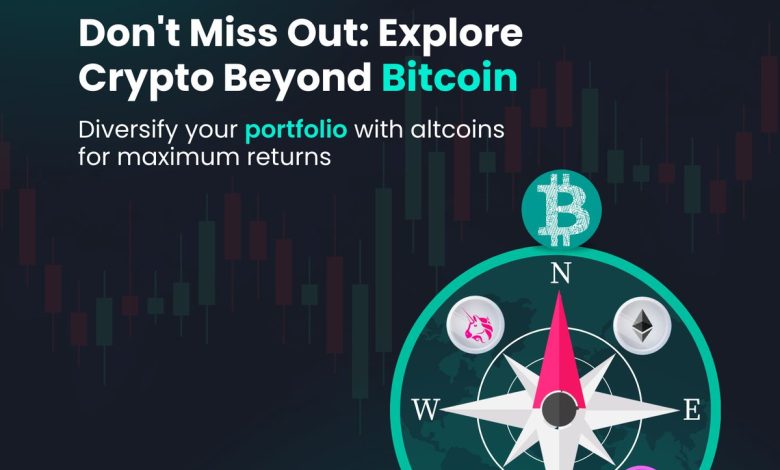What Are Altcoins? Exploring the World Beyond Bitcoin

- Understanding the Basics of Altcoins
- The Rise of Altcoins in the Cryptocurrency Market
- Exploring the Diverse Landscape of Alternative Cryptocurrencies
- Comparing Altcoins to Bitcoin: What Sets Them Apart?
- Investing in Altcoins: Tips and Strategies for Success
- The Future of Altcoins: Trends and Predictions in the Crypto Space
Understanding the Basics of Altcoins
Altcoins, or alternative cryptocurrencies, are digital assets that were created as alternatives to Bitcoin. While Bitcoin was the first cryptocurrency to gain widespread popularity, altcoins have since emerged as competitors in the digital currency market. Understanding the basics of altcoins is essential for anyone looking to diversify their cryptocurrency portfolio or explore new investment opportunities.
One key difference between altcoins and Bitcoin is their underlying technology. While Bitcoin operates on a blockchain network, many altcoins use different technologies such as Ethereum’s smart contract platform or Ripple’s consensus ledger. These technologies allow altcoins to offer unique features and functionalities that set them apart from Bitcoin.
Altcoins can serve a variety of purposes beyond simply being a digital currency. Some altcoins are designed for specific use cases, such as privacy-focused transactions or decentralized applications. Others may offer faster transaction speeds or lower fees compared to Bitcoin. By understanding the different types of altcoins available, investors can choose assets that align with their investment goals and risk tolerance.
The Rise of Altcoins in the Cryptocurrency Market
As the popularity of cryptocurrencies continues to grow, so does the rise of altcoins in the market. Altcoins, or alternative cryptocurrencies to Bitcoin, have gained traction among investors and traders looking for new opportunities in the digital asset space.
One of the main reasons for the surge in altcoin popularity is the desire for diversification in investment portfolios. While Bitcoin remains the dominant player in the cryptocurrency market, altcoins offer a way for investors to spread their risk and potentially achieve higher returns.
Another factor driving the rise of altcoins is the innovation and experimentation happening within the cryptocurrency space. Developers are constantly creating new altcoins with unique features and use cases, catering to different niches and preferences within the market.
Furthermore, the increasing acceptance and adoption of cryptocurrencies in various industries have also contributed to the growth of altcoins. As more businesses and individuals start using digital assets for transactions and investments, the demand for a variety of altcoins has increased.
Overall, the rise of altcoins in the cryptocurrency market signifies a shift towards a more diverse and dynamic ecosystem. With new altcoins being introduced regularly and existing ones evolving to meet changing demands, the world beyond Bitcoin is becoming increasingly vibrant and exciting for crypto enthusiasts.
Exploring the Diverse Landscape of Alternative Cryptocurrencies
Exploring the diverse landscape of alternative cryptocurrencies opens up a world of possibilities beyond Bitcoin. These altcoins offer unique features and functionalities that cater to specific niches within the digital currency market. From privacy-focused coins to tokens designed for decentralized applications, there is a wide range of options for investors and enthusiasts to explore.
One of the most popular altcoins is Ethereum, known for its smart contract capabilities that enable developers to build decentralized applications (dApps) on its blockchain. Ripple, on the other hand, focuses on facilitating cross-border payments for financial institutions. Litecoin offers faster transaction speeds compared to Bitcoin, making it a preferred choice for everyday transactions.
Other altcoins like Monero prioritize privacy and anonymity, using advanced cryptographic techniques to ensure the confidentiality of transactions. Dash, formerly known as Darkcoin, emphasizes both privacy and speed through its PrivateSend feature. Meanwhile, EOS aims to provide a platform for scalable and secure dApp development.
As the cryptocurrency market continues to evolve, new altcoins are constantly being introduced, each with its own unique value proposition. Whether you are interested in exploring innovative technologies, supporting specific causes, or diversifying your investment portfolio, altcoins offer a wealth of opportunities to engage with the digital economy in exciting new ways.
Comparing Altcoins to Bitcoin: What Sets Them Apart?
When comparing altcoins to Bitcoin, it is essential to understand the key differences that set them apart. While Bitcoin is the original and most well-known cryptocurrency, altcoins offer unique features and functionalities that differentiate them from Bitcoin. Here are some factors to consider when comparing altcoins to Bitcoin:
- Technology: Altcoins often utilize different underlying technologies than Bitcoin, such as proof of stake or directed acyclic graph (DAG) protocols. These technologies can offer advantages in terms of scalability, security, and transaction speed.
- Use Cases: Altcoins are designed for specific use cases or industries, such as decentralized finance (DeFi), supply chain management, or social media platforms. This specialization can make altcoins more suitable for certain applications than Bitcoin.
- Community and Development: Altcoins have their own communities of developers, supporters, and users who contribute to the ongoing development and improvement of the projects. This can lead to rapid innovation and adoption of new features.
- Market Cap and Liquidity: While Bitcoin has the largest market cap and highest liquidity of any cryptocurrency, altcoins can offer opportunities for investors to diversify their portfolios and potentially achieve higher returns.
- Regulation and Compliance: Altcoins may be subject to different regulatory environments than Bitcoin, depending on their specific use cases and jurisdictions. Understanding the regulatory landscape is crucial for investors and users of altcoins.
Overall, altcoins offer a diverse and dynamic ecosystem that complements Bitcoin’s role as a store of value and digital gold. By exploring the world beyond Bitcoin, investors and users can discover new opportunities and innovations in the cryptocurrency space.
Investing in Altcoins: Tips and Strategies for Success
Investing in altcoins can be a lucrative opportunity for those looking to diversify their cryptocurrency portfolio beyond Bitcoin. However, it’s essential to approach altcoin investment with caution and a well-thought-out strategy to maximize your chances of success. Here are some tips and strategies to consider when investing in altcoins:
- Do Your Research: Before investing in any altcoin, make sure to thoroughly research the project, team, technology, and market potential. Look for altcoins with strong fundamentals and a clear use case.
- Diversify Your Portfolio: Spread your investment across multiple altcoins to reduce risk and increase the potential for higher returns. Avoid putting all your eggs in one basket.
- Stay Informed: Keep up to date with the latest news and developments in the altcoin market. Stay informed about regulatory changes, partnerships, and technological advancements that could impact the value of your investments.
- Set Realistic Goals: Define your investment goals and risk tolerance before investing in altcoins. Set realistic expectations and avoid making impulsive decisions based on market hype or fear of missing out.
- Use Dollar-Cost Averaging: Consider using a dollar-cost averaging strategy to invest a fixed amount of money at regular intervals. This can help reduce the impact of market volatility on your investment.
By following these tips and strategies, you can increase your chances of success when investing in altcoins. Remember to always do your due diligence and never invest more than you can afford to lose. With careful planning and a disciplined approach, altcoin investment can be a rewarding venture in the world of cryptocurrency.
The Future of Altcoins: Trends and Predictions in the Crypto Space
The future of alternative cryptocurrencies, or altcoins, is a topic of great interest and speculation in the crypto space. As the market continues to evolve and mature, there are several trends and predictions that experts are keeping an eye on.
- One trend that is expected to continue is the rise of decentralized finance (DeFi) projects. These projects aim to disrupt traditional financial systems by offering services such as lending, borrowing, and trading without the need for intermediaries.
- Another trend to watch is the increasing adoption of non-fungible tokens (NFTs). NFTs are unique digital assets that represent ownership of a specific item or piece of content. They have gained popularity in recent years, with artists, musicians, and even sports teams getting involved.
- Interoperability between different blockchains is also expected to be a key focus in the coming years. Projects like Polkadot and Cosmos are working on solutions to allow different blockchains to communicate with each other, which could help to solve scalability issues and improve overall efficiency.
- Privacy-focused altcoins are also likely to see continued growth, as individuals become more concerned about their online privacy and security. Coins like Monero and Zcash offer enhanced privacy features that appeal to users looking to keep their transactions confidential.
Overall, the future of altcoins is bright, with new projects and innovations constantly emerging. While Bitcoin remains the dominant player in the cryptocurrency market, altcoins offer investors and users a diverse range of options to explore and invest in. As the industry continues to evolve, it will be interesting to see which trends and predictions come to fruition, and how they will shape the future of the crypto space.



